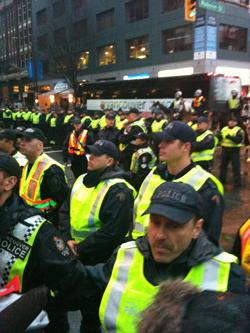We were ambling up Dunsmuir towards the Robson Square zipline when several officers suddenly stepped forward and detained my friend.
They said they recognized him from the protest on Saturday, the one that turned ugly. They called him an instigator.
He wasn’t, Davyd had already told me over coffee that morning.
He was there, yes, but he neither threw anything nor condoned the destruction. He was there to peacefully protest all the resources allocated to the Olympics, he said.
I wasn’t there that morning. I didn’t see the masked protesters angrily break the Bay’s windows. I didn’t see the peaceful protesters hoist a ladder to hold as a barrier between themselves and the advancing line of riot police. I didn’t feel the fear likely mounting on all sides, nor did I hear the riot police allegedly attempt to goad the ladder line.
But I did watch seven officers converge on my friend the next day, handcuff him and send him to jail. And I was shocked.
“What are you charging him with?” I asked, even as I punched in the number for the BC Civil Liberties’ legal observers team.
Anticipated breach of the peace.
Anticipated? “But we’re on our way to the Olympic zipline,” I pointed out.
Your friend participated in the violent protest yesterday and may be on his way to join another one now, Const C Bridges politely explained to me.
Bridges was actually nice to me and seemed genuinely convinced that Davyd might pose a threat to the public.
“Even if you think he breached the peace yesterday, how do you justify detaining him now in anticipation of another offence?” I asked.
We’re going ziplining, I reminded him. Wouldn’t you have to expect another breach imminently in order to detain him?
This is not a new police power, Bridges replied. Police have always been empowered to keep the peace and prevent its breach.
So you’re just going to pluck him and any other protester you recognize out of the public realm today to preempt any possible protests like yesterday’s, I summarized.
That’s a pretty broad police power. Especially when wielded in the context of political protest.
And it’s a power that’s rarely reviewed, notes lawyer Garth Barriere.
Common law grants police the power to detain people for breach of the peace, he explains, but the scope of the power and the way in which it’s exercised is rarely challenged because it rarely results in criminal charges against the detainees. They’re usually just removed from the public sphere for a while then released.
State powers should be reviewed on an ongoing basis to keep them honest, Barriere says.
The fact that these cops were exercising that power with a broad interpretation of anticipated harm in the context of a political protest makes me uncomfortable. The fact that this was taking place against an Olympic backdrop does nothing to ease my discomfort.
Only two days earlier I’d hauled myself out of bed before 7am to catch the torch run by my office. I may have misgivings about the level of resources allocated to the Games, but I still like the Olympic buzz. I like the crowds, the traffic downtown, the shared sense of celebration. It’s a fun party and I’m glad I live in a host city.
But I’m having a hard time with the heightened security and I can’t ignore its presence.
Neither can Micheal Vonn from the BC Civil Liberties Association. She’s been hearing reports for months about members of the Integrated Security Unit (ISU) paying visits to known protesters.
The ISU visited all kinds of people to assess their threat level as the Games approached, Vonn says. They knew people’s names, cell phone numbers, schedules.
It was an “ostentatious display of investigation,” she says. A way to intimidate “people who have done absolutely nothing but express a political view. This is deeply concerning in the Canadian context.”
Concerning but not surprising.
Police forces in North America and Europe have been implementing all sorts of new tools and special rules — like security perimeters and airport-style screening — at mega-events like the Olympics and leaders’ summits for years.
Academics warn that these “mega-events are a Trojan horse for a kind of sea-change in police culture,” Vonn says.
To be fair, she notes, the police response to the first Olympic protest on Friday was generally “excellent” and restrained. And thousands of people have peacefully taken to the streets in the last few days to express their views without constraint.
I counted 22 officers at the latest protest last night, but everything remained peaceful as protesters objected to government spending on the Games and Canada’s presence in Afghanistan. One of the officers even thanked attendees for their cooperation and told me he was there to let the marchers make their voices heard.
I left the march feeling reassured that the ISU has not taken over Vancouver. Then I noticed another cop quietly filming the protesters.
“The Olympics is an anomaly,” Vonn says, “but what is happening here is not.”
As I trudged up the hill on Sunday to join the rest of my friends at the zipline, I recalled my favourite chant from Friday’s protest. “This is what democracy looks like,” protesters had exuberantly cheered that afternoon, revelling in the right to freely express their dissenting opinions openly, publicly and loudly.
What does it look like now? I wondered, as I waited for Davyd to call.

 Why you can trust Xtra
Why you can trust Xtra


